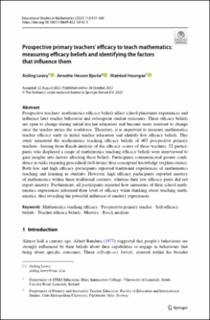| dc.contributor.author | Leavy, Aisling | |
| dc.contributor.author | Bjerke, Annette Hessen | |
| dc.contributor.author | Hourigan, Mairéad | |
| dc.date.accessioned | 2023-08-01T12:51:55Z | |
| dc.date.available | 2023-08-01T12:51:55Z | |
| dc.date.created | 2022-11-03T14:09:42Z | |
| dc.date.issued | 2022 | |
| dc.identifier.citation | Educational Studies in Mathematics. 2022, . | en_US |
| dc.identifier.issn | 0013-1954 | |
| dc.identifier.uri | https://hdl.handle.net/11250/3082161 | |
| dc.description.abstract | Prospective teachers’ mathematics efficacy beliefs affect school placement experiences and
influence later teacher behaviour and subsequent student outcomes. These efficacy beliefs
are open to change during initial teacher education and become more resistant to change
once the teacher enters the workforce. Therefore, it is important to measure mathematics
teacher efficacy early in initial teacher education and identify low efficacy beliefs. This
study measured the mathematics teaching efficacy beliefs of 402 prospective primary
teachers. Arising from Rasch analysis of the efficacy scores of these teachers, 22 partici-
pants who displayed a range of mathematics teaching efficacy beliefs were interviewed to
gain insights into factors affecting these beliefs. Participants communicated greater confi-
dence in tasks requiring procedural (tell-items) than conceptual knowledge (explain-items).
Both low and high efficacy participants reported traditional experiences of mathematics
teaching and learning as students. However, high efficacy participants reported mastery
of mathematics within these traditional contexts, whereas their low efficacy peers did not
report mastery. Furthermore, all participants reported how memories of their school math-
ematics experiences informed their level of efficacy when thinking about teaching math-
ematics, thus revealing the powerful influence of mastery experiences. | en_US |
| dc.language.iso | eng | en_US |
| dc.rights | Navngivelse 4.0 Internasjonal | * |
| dc.rights.uri | http://creativecommons.org/licenses/by/4.0/deed.no | * |
| dc.title | Prospective primary teachers’ efficacy to teach mathematics: measuring efficacy beliefs and identifying the factors that influence them | en_US |
| dc.type | Peer reviewed | en_US |
| dc.type | Journal article | en_US |
| dc.description.version | publishedVersion | en_US |
| cristin.ispublished | true | |
| cristin.fulltext | original | |
| cristin.qualitycode | 2 | |
| dc.identifier.doi | 10.1007/s10649-022-10181-1 | |
| dc.identifier.cristin | 2068677 | |
| dc.source.journal | Educational Studies in Mathematics | en_US |
| dc.source.pagenumber | 24 | en_US |

